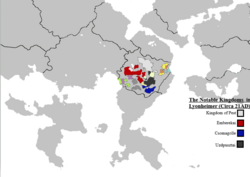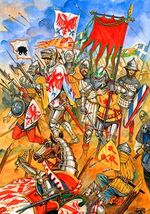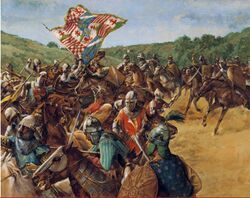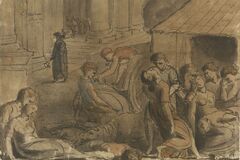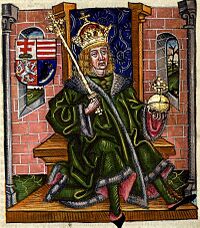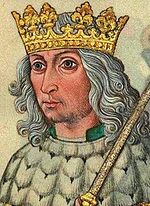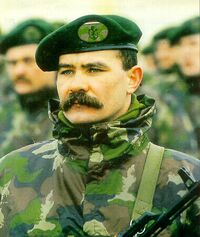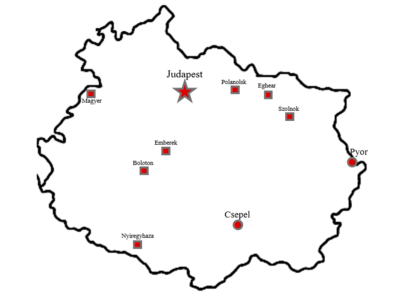Lyonheimer
This section is actively undergoing a major edit for a short while. To help avoid edit conflicts, please do not edit this section while this message is displayed. This page was last edited at 23:20, 10 December 2021 (UTC) (3 years ago). Please remove this template if this page hasn't been edited in several hours. If you are the editor who added this template, please be sure to remove it or replace it with {{Under construction}} between editing sessions. |
Lyonheimer Magylonheimerzstág
Other:
| |||||||||||
|---|---|---|---|---|---|---|---|---|---|---|---|
| Motto: "Dicsőség földjeinknek" "Glory to Our Lands" | |||||||||||
| Anthem: "Himnusz" | |||||||||||
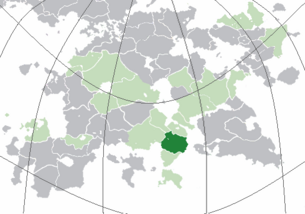 | |||||||||||
| Capital and largest city | Judapest | ||||||||||
| Working languages | Lyonheimerish | ||||||||||
| Recognized Regional Languages |
| ||||||||||
| Ethnic groups | Uralic, Ugric, Germanic | ||||||||||
| Demonym(s) | Lyonheimerman/Lyonheimerish | ||||||||||
| Government | Parliamentary Representative Republic | ||||||||||
• Prime-Minister | Izsak Rákosi | ||||||||||
• Vice-Minister | Yuri Merton | ||||||||||
| Legislature | The Lyonheimmer Second Parliament. | ||||||||||
| Establishment | |||||||||||
| 1334-1873 | |||||||||||
| 1873-1912 | |||||||||||
| 1912-1954 | |||||||||||
• Kingdom of Lyonheimer | 1954-Present | ||||||||||
| Area | |||||||||||
• Total | 505,498 km2 (195,174 sq mi) | ||||||||||
| Population | |||||||||||
• 2021 estimate | 28,712,900 | ||||||||||
• 2014 census | 28,211,100 | ||||||||||
| Currency | Lyonheimerish Fornit (FOR) | ||||||||||
| Time zone | UTC-1 (UTC -1) | ||||||||||
| Date format | dd-mm-yyyy | ||||||||||
| Driving side | right | ||||||||||
| Calling code | +36 | ||||||||||
| ISO 3166 code | LYO | ||||||||||
| Internet TLD | .LY | ||||||||||
Lyonheimer (Lyonheimerish: Magylonheimerzstág) is a parliamentary representative republic in southern Thrismari. It borders Toubaze to the north, Medovia to the north west, Gwyenn to the West and Gotneska to the south. With around 28 million inhabitants, Lyonheimer is a medium sized centrist kingdom. The official language spoken in the nation is Lyonheimerish, however only an estimated 200,000 people even know how to speak the language and most speak Lyonheimerish. Lyonheimer's capital, and largest city is Judapest. Some other urban areas include Csepel, Emberek and Pyor. The current leaders of the nation are acting Prime-Minister Izsak Rákosi, and the Head of State is King Faveskas Orban. The country scales at 505,498km2 and the highest point is 5,281m (Mount Varsaves). Lyonheimer uses the Lyonheimerish Fornit as the currency in the nation.
Lyonheimer was first formed in the 1300s in the form of the united First Kingdom of Lyonheimer, united under one banner from the Uralic Kingdoms of Lyonheimer by Stephen I, a member of the Baros dynasty, of Lyonheimer upon the signing of the Treaty of Csepel. During his reign he set the groundwork for the first united Kingdom of Lyonheimer with his progressive, at the time, ideas as well as clearing some of the nations debt. It was also during his reign that Lyonheimer's independence was guaranteed by the Silvadum City State and Pope due to Stephen's close relations with the Pope, also being named a 'Saint'. For the following years, Lyonheimer remained stable with relations to neighbours being generally positive. The next major event was the change of Royal Family in the late 1400s, from the Baros dynasty to the new Zápolya family. One of the earliest monarchs of the Zápolya family was King Laszlo II, otherwise known as the 'Golden King'. He gained this nickname due to the vast amount of wealth he brought to Lyonheimer hoowever more importantly he put into place the parliamentary constitution, which put a parliament into place, orginally in the city of Eghear but relocated to Ójuda later on. This constitution meant that an amount of power was taking from the Monarch and given to the new parliament, a very popular move which began the trend of Parliamentary Monarchies in Thrismari, being one of the first in the world to have that from of government so early in history. Laszlo II was killed in battle during the 300 Days War, alongside his countries people. His remains are yet to be found, believed to be thrown into the sea off the coast of Pyor. It was following Laszlo's death that things started to decline slightly, starting with a class divide becoming extremely noticeable, and corruption being a huge theme. Despite this, it was also at this time, the mid-1500s, that Lyonheimer established a very strong, organised standing military, giving them great stability in the geopolitical world. The people of Lyonheimer began enjoying being a part of the empire in the mid 1500s, most living lives much better than those in neighbouring countries at the time. Great roads between cities were built and the economy was bustling under the rulership of a great parliamentary system. However this went downhill fast with the rule of Queen Lili I, known as 'Lili the Horrible' by many. Her reign began by taking a large amount of power away from the parliament and returning to a monarchy, with the parliament only advising the actions of the queen. This caused great controversy within the nation, causing many to stand up to the government. This resulted in the Lyonheimerish People's Revolt which ended in governmental victory and overtaking of the monarchy, however it much weakened the nation as royalists still do not support the government. This much weakened the military, leaving them very poor also due to war damages to cities such as Emberek and Eghear. This resulted in the Lyonheimerish People's Revolt which ended in governmental victory and overtaking of the monarchy, however it much weakened the nation as royalists still do not support the government. This much weakened the military, leaving them very poor also due to war damages to cities such as Emberek and Eghear. A further event that weakened the empire was the Lyonheimerish-Pyorvian War which cost Lyonheimer lives and money, however gaining the territory of the Duchy of Pyor. It was also around this time that the economy worsened with trade from other nations was at holt. The end of the kingdom began as Krenya looked to expand their colonial empire in Thrismari. At first, it would look like Krenya would be unable to take the kingdom of Lyonheimer due to the regional power they had. Despite this, when Krenya invaded in 1870, they easily swept through the land due to revolutionaries from Gwyenn, Emberek and Csepel who helped the Krenyans in their conquest of the nation, which resulted in the First Kingdom of Lyonheimer to be annexed into Krenyan-Lyonheimer in the year 1873.
Under the Krenyan occupation, Lyonheimer took many steps backwards. Firstly, the power of Head of State was handed to the reigning duke of Krenya, with a de-facto leader role given to the king of Lyonheimer at any time. Life also became much worse under the Krenyan occupation, with standard of living decreasing and many Lyonheimerish immigrating to foreign countries (Lyonheimerish Migration Crisis (1889)) which lead to the borders being shut down in 1890. This caused further unrest going into the 1900s, with Lyonheimer becoming considerably poorer than before as well as having less citizens, with the population estimate in 1895 being 29.5 million. In 1905, Krenya had claims to further territory in Gwyenn, perhaps with intention of turning it into a colony. To fulfil such ambitions the Duke made a proposal to the king Stephen III to invade Gwyenn in 1905, and due to being a puppet state of Krenya, he was forced into agreement, with Lyonheimer declaring war on Gywenn in November 1905. The initial months of the war started well for Lyonheimer, who had aligned themselves alongside Krenya with the Iron Pact in order to get some military support. However the turning point was as both sides began digging large trenches, Gwyenn had been prepared for attack long before the war, meaning they had a defensive line ready. Furthermore, they joined The Alliance which gave them huge military support which they needed being essentially alone in the south. Once Gwyenn had pushed through the first line, it only became worse for the Krenyans and Lyonheimerish as due to the lack of resources given by the Iron Pact they began to freeze and run out of food going into winter 1906, something that Gwyenn had no issue with due to better equipment. Morale also became low meaning the soldiers did not fight at the quality of the trained Gwyennian soldiers. By 1908, the Lyonheimerish had been pushed all the way back to the Lübbenau Mountains, with a huge yearlong stalemate as trenches were dug in the cold altitudes. At this point in the year, around 1910, Lyonheimer already knew they may lose due to economic impacts, and so they retreated forces to Judapest before official surrender in October 1911. In August 1912 the Treaty of Millerston decided the modern borders of Lyonheimer. Following the war, the decision was made to place a communist government into power was made by The Alliance as it was the most popular in the country at the end of the war, forming into the Lyonheimer Soviet Republic. The first ten years of the Soviet Republic were considered to be widely successful in comparison to the former government under Krenya, with the communist leadership working towards making Lyonheimer stable with money after the war. Issues arose as the third leader, Milkos Varmaskov, came into power. To begin with, he started to spend money on the nations army as well as moving away from allies internationally. After that, he became widely unpopular due to the 1943 Voting Scnadal in which it is believed Varmaskov may have attempted to poison his opposition Erven Vereb as well as rigging the vote in his favour. For the following years, he made many questionable decisions in which many did not agree with and as the world progressed it seemed as if communism was holding Lyonheimer back. The final straw for many with Varmaskov was his cancelling of the 1947 and 1951 elections meaning he would stay in power for as long as he wished. This caused mass outrage, with a group banding together to start the Lyonheimerish Communist Revolution in 1953. The aftermath of the events were generally positive, with a parliamentary system being reintroduced, initally lead by Samir Imre who did an amazing job with Lyonheimer and it's redevelopment and modernisation with the other nations of Anteria. From the period of between 1960-1980 Lyonheimer slowly built up their economy to be on level with the other nations of Thrismari with leaders such as János Rákosi and Gordon Bajnai. In 1998, Lyonheimer was amongst the first nations to enter into the Thrismari Union, a show of great stability for Lyonheimer.
Lyonheimer is considered a middle power in global affairs, due to it's cultural, historic and economic influence. It is considered a well developed country with a high income economy and currently is ranking 'very high' in the human development index with citizens having the luxury of universal healthcare. Lyonheimer is also a common tourist destination in southern Thrismari. Lyonheimer are members of a good amount of international organisations including the Anterian World Assembly, Thrismari Union and the International Court.
Etymology
The name Lyonheimer derives itself from the native Lyonheimerish word for the country, Magylonheimerzstág. Magylonheimerzstág means literally 'Land of the Magylonheimers' in Old Lyonheimerish, with the name becoming different more and more over history from it's original meaning.
History
Before 210BC
Lyonheimer's history begins as Ugrics from northern Sarussia migrate down passed the Tauban Strait and into Lyonheimer, where they settled and brought with them their Ugric language of Lyonheimerish. These people were known as the Hung Dynasty, and eventually would form into many kingdoms in the year 210BC.
Uralic Kingdoms
Following the creation and independence of many kingdoms, Lyonheimer was split up into 13 prominent kingdoms, with other small communities with little attraction. The primary kingdoms were made up of lands all the way from the Lübbenau Mountains in the west to the Pyorvian Coast in the east, past the River Lonad. These kingdoms occupied Lyonheimer's current borders for hundreds of years from around 210BC, with changing borders due to the conflicting between the kingdoms. The most prominent two being the kingdoms of Ójuda and Csepel, with evidence being found of the two nations having developed armies in comparison to the rest, with the siege tower being used in particular by the Ójudans. Further, the city state of Eghear had developed battle strategies and formation in comparison to the rest.
In 109BC the kingdoms began to struggle with pressure from the neighbouring Gwyennian kingdoms, causing a few to succeed to their united kingdom.
in 100BC the migration of germanic tribes happened, mixing with the uralics in modern south Toubaze. Other ethnic groups in the lands at the time include the celts, slavs and medovians in the north west. In 73BC the Ójudans expanded hugely past the River Hornád which they had rarely ventured past, establishing themselves as the dominant kingdom in the area.
In 23AD the Evars arrived from central Thrismari, establishing the short lived Evarrian Caliphate which gave short challenge to the established however unstable kingdoms.
The Lyonheimer Unification Wars began in the year 750, being a group of wars that caused many changes throughout the kingdoms despite the long lasting of them. They began with the first Judan-Csepeli war of 750, which ended in defeat and subsequent occupation of Csepel for 20 years by the Ójudans. Many other smaller wars which includes the Eghear-Pyorviat and Csepli-Emberekan wars being the most notable. It is estimated by some that over 100,000 died in the wars between 750 and 1332 as they became increasingly more violent as technology advanced.
The turning point was the reign of Stephen I, beginning in 1317. As a child Stephen was trained in war tactics and became an incredibly popular figure as king of Ójuda incredibly fast, enjoying the luxuries of early kingship. However he started to gain the most amount of his popularity as he promised a united Lyonheimer, something a lot of kings had promised for years at the time. He began by convincing small, unrecognised kingdoms to join him before first gaining the kingdom of Eghear in 1319. This was a huge sucess that made many have faith in the leader as his army built up and he began to take kingdoms incredibly easily, with the likes of Balaton and Magyer being taken by 1325. As of 1329, the only three kingdoms left were Csepel, Ójuda and Emberek. Stephen was preparing for war with Emberek first as although powerful, they were not at the level of Csepel at the time. Stephen invaded the kingdom of Emberek in 1329, leaving only Csepel in the way of Lyonheimerish unification.
The soldiers of Ójuda were trained ready for invasion, with the army accepting anyone. Although at peace for a while, the Kingdom of Ójuda declared war on Csepel in 1331, lead with unity by Stephen I. The invasion was short lasted for the amount of land Ójuda had to take in order to win, they managed to capture the capital city of Csepel in less than a year, giving Stephen I the nickname 'Stephen of Csepel'. In the year following, 1332, Stephen was asked by the Pope to be the king of a united Lyonheimer, so with this blessing he wrote the Treaty of Csepel which resulted in the formation of the First Kingdom of Lyonheimer in 1332. People were generally very happy with the unification, due to the cultural and linguistic similarities between the former kingdoms.
First Kingdom of Lyonheimer
Beginning of the Kingdom of Lyonheimer (Medieval Era)
Early Kingdom
The First Kingdom of Lyonheimer formed from the united Ugric states in the year 1332, following the merging of all of the kingdoms, except the Duchy of Pyor which stayed independent right up until 1801. This occurred following the signing of the Treaty of Csepel, which was written by the first King of Lyonheimer, Stephen I, member of the Baros dynasty. The early days of Lyonheimer had much political unrest, with illegitimate Kings and Queens as well as unrest for the people of the nation, however united under one banner. The freshly unified Lyonheimerish people settled in and around the Parathian Basin. According to Ugric historians, these people originated from the northern mountain range in Sarussia, which is where the language developed.
As a kingdom made up of united Uralic tribes and kingdoms, it began with semi-nomadic peoples. This state was well-functioning, and the nation's military power allowed the Lyonheimerish to conduct successful fierce campaigns and raids into Gwyenn as far as Millerston and into northern Gotneska. Lyonheimer defeated no fewer than 2 major foreign kingdoms in Thrismari before defeat at the Battle of 1365 which ended the ambitions of foreign conquest for Lyonheimer. After this defeat, it was ordered that hundreds of stone castles and fortifications be built in Lyonheimer for better protection.
Age of Barosian Kings
The next major event was in 1376 when king Béla II officially established the Church of Lyonheimer with approval from the Sivladum City State. This drew them closer to the rest of southern Thrismari. Béla also consolidated his power, and started sweeping reforms to convert Lyonheimer into a Southern feudal state. Around this time, Lyonheimer started to become a powerful kingdom. They expanded their lands further in to Gwyenn in 1386, establishing a general border for hundreds of years.
In 1413 the richest and by some estimates 'most powerful' of the Baros kings was coronated, Emeric I. Emeric deposed the equivalent of 29 tonnes of silver. This was the largest amount in the world at the time.
In the mid 1400s, the first reports of the deadly Heratic Plague were made in Lyonheimer, close to Pyor. The plague spread like wildfire within the large cities and communities, being a incredibly infectious disease. This meant awful effects came onto the kingdom, with an estimated death toll of 1,500,000 and huge amounts of economic impact on the country as well as those around in southern Thrismari. Symptoms of the plague included vomiting, extreme hives and irritated itchy skin, black boils, stabbing pain which would eventually result in death. The plague was spread by rats and due to poor hygiene and amount of infected bodies it became a huge issue. Going into the late 1400s, people had already started to think of cures, with the most effective being Vitamin C blends, prescribed for those who could afford doctors. The issue was doctors became rare for those without good wealth, this is due to many exploiting the working class with fake medicines in order to pay for personal health. The end of the plague came with Igor Jancsó's discovery of handwashing in medical practise, which made the level of hygiene in Lyonheimer increase hugely. This, as well as isolations for those who had the disease and better overall hygiene lead to the plague disappearing by the 1500s.
Beginnning of the Zápolya Family
One of the final major events of the medieval era was the change of the royal family from the Baros Dynast to the Zápolya family of monarchs. This occurred due to the death of Andrew I who had no heirs to the throne directly descending from Baros, meaning the nearest heir was a part of a different family. The nearest heir was Emeric III, who became the first king of the new dynasty. Under his rule, the country made good strides in recovering from the recently 'finished' Heratic Plague, which still had small cases reported all the way until the 1600s.
Emeric III, despite having an incredibly short reign, is beloved for being the one to prioritise the holiday of Christmas for the Lyonheimerish people, with him making Advent a holiday in which people must take a day of rest and to the present day Lyonheimer remains one of the most Christmas-heavy countries. Due to this, Father Christmas is often referred to as Saint Emeric in Lyonheimer. Other notable actions of his reign include holding off foreign powers and reforming the economy post-plague.
Lyonheimer's army equipment at this time was superior to the majority around them for the very early 1500s, with the army being organised with an official hierarchy of ranks as well as impressive evidence of tactical excellence for the time. This helped them establish the beginning of their height.
Emeric's rule came to an early end upon his assassination in 1501 leaving his brother, Laszlo, as the next heir to the throne.
Height of the Kingdom of Lyonheimer (Middle Ages)
King Laszlo's Reign
In December 1501, King Laszlo II was coronated in Saint Heimer's Cathedral in Ójuda as brother of the recently assassinated Emeric III. He took control of a stable Lyonheimer, who had a decent economy and happy citizens following the end of the Heratic Plague. Before his coronation nobody knew how much of a reformer Laszlo would be for Lyonheimer.
His reign began with the simple, however effective, removal of the Window Tax. This made many have faith in Laszlo as a king, with people paying taxes without issue and more signing up for the army and volunteering. After that, Laszlo's second decree was the acceptance of women into the military, as well as having compulsory training for troops before being sent to war, meaning the soldiers would all have background checks to confirm they are eligible, which at first caused issues as number of troops decreased however upon training it became a huge improvement for the quality in the army.
As of 1505, Laszlo had gained great respect already, having made great decisions in his initial years as well as good reputation from his brother. His next major decision was his most influential, the establishment of the Parliament in Lyonheimer, initially in the city of Eghear before being moved to the current capital Judapest. This caused a huge change in power with the parliament taking a huge amount of power away from the monarchy, with the king only remaining as head of state. This was one of the worlds first parliamentary republics, with Laszlo as the reason for the progressiveness of Lyonheimer. This was a highly popular move, with him sacrificing his monarch power to give Lyonheimer a democratic system.
Fall of the Kingdom of Lyonheimer
As the year 1700 began to approach the kingdom's decline began. It started with the coronation of Lilli I, who would be regarded as one of the worst monarchs in history. Her reign began by taking a large amount of power away from the parliament and returning to a monarchy, with the parliament only advising the actions of the queen. This caused great controversy within the nation, causing many to stand up to the government.
This resulted in the Lyonheimerish People's Revolt which ended in governmental victory and overtaking of the monarchy, however it much weakened the nation as royalists still do not support the government. This much weakened the military, leaving them very poor also due to war damages to cities such as Emberek and Eghear.
A further event that weakened the empire was the Lyonheimerish-Pyorvian War which cost Lyonheimer lives and money, however gaining the territory of the Duchy of Pyor. It was also around this time that the economy worsened with trade from other nations was at holt.
The end of the kingdom began as Krenya looked to expand their colonial empire in Thrismari. At first, it would look like Krenya would be unable to take the kingdom of Lyonheimer due to the regional power they had. Despite this, when Krenya invaded in 1870, they easily swept through the land due to revolutionaries from Gwyenn, Emberek and Csepel who helped the Krenyans in their conquest of the nation, which resulted in the First Kingdom of Lyonheimer to be annexed into Krenyan-Lyonheimer in the year 1873.
Sports
Football
Football is the national sport of Lyonheimer, and holds a special place in the peoples hearts. The nation has a proud sporting history, dating back to the late 1800s and football was always the nations frontrunner. Football, or as some call it 'soccer', began in the nation as the LHFA (Lyonheimer Football Association) was founded in 1889 and the football league began in 1892. The Lyonheimer Premiera Bajnoki was one of the best leagues in the world at the time, as most young boys from the nation would aspire to be a footballer.
Famous footballing icon Ferenc Askas is from Lyonheimer. He is known for being, officially, the all time record goal scorer in all of Anteria. Askas was a prolific scorer, who netted 591 times in 631 senior appearances. One of the most famous Lyonheimermen of all time, he went down as a legend in the nation, for his goal scoring prowess.
Another sport Lyonheimer has had some success with other sports, notably boxing with legend László Papp being regarded as one of the most influential figures of the 20th Century.
The LMNT (Lyonheimer Mens National Team) have been successful on occasion over the years, being IFA World Cup winners on 3 occasions and being runners-up on 2 separate occasions.
Other Sports
People of Lyonheimer do play some other sports. The nation has been successful in rowing, weightlifting, tennis and cricket. Lyonheimer also has widely successful motorsport drivers.
Culture
Food
Food is not a huge part of Lyonheimer culture, however there is some native dishes from the nation. The most famous and important dish to the people is Goulash, a soup made originally for shepherds that has become the national dish. It is made of meat, vegetables and noodles. These are the Lyonheimer variants of Goulash:
Székely Gulyás. Omit the potatoes and add sauerkraut and sour cream. Gulyás Lyonheimerish Plain Style. Omit the homemade soup pasta (csipetke) and add vegetables. Mock Gulyás. Substitute beef bones for the meat and add vegetables. Also called Hamisgulyás, Bean Gulyás. Omit the potatoes and the caraway seeds. Use kidney beans instead. Csángó Gulyás. Add sauerkraut instead of pasta and potatoes. Betyár Gulyás. Use smoked beef or smoked pork for meat. Likócsi Pork Gulyás. Use pork and thin vermicelli in the goulash instead of potato and soup pasta. Flavored with lemon juice. Mutton Gulyás or Birkagulyás. Made with mutton. Add red wine for flavor.
Music
Lyonheimerish music consists mainly of traditional folk music and music by prominent composers such as Liszt and Bartók, considered to be among the greatest Lyonheimerish composers. Other renowned composers are Dohnányi, Franz Schmidt, Zoltán Kodály, Gabriel von Wayditch, Rudolf Wagner-Régeny, László Lajtha, Franz Lehár, Imre Kálmán, Sándor Veress and Rózsa. Lyonheimerish traditional music tends to have a strong dactylic rhythm, as the language is invariably stressed on the first syllable of each word.
Holidays
Holidays are a big part of Lyonheimer. They celebrate seven nationally recognised holidays, and many minorities in the region celebrate their own too. The main holiday in Lyonheimer is Christmas, which is extremely important and special to the, largely Christian, population. Each of the Christmas events are working days, including advent. The traditions of the nation say that on Advent, people exchange small gifts of chocolate and wine to show love and appreciation for each other and many go and sing carols at church or visit close family who don't have anyone at this time of year. Christmas Eve, citizens go to the local church and sing Christmas carols with friends and family. Many will spend the whole day doing such activites, as well as exchanging small gifts in the evening. The tradition is for the parents to put oranges in both the slippers of their children for when they wake up on Christmas morning. The house will usually be very decorated with a vast table of food, with turkey as the center-piece of the table. In the morning, children will go downstairs and recieve gifts, usually mountains full of them. They will then all put money towards buying their parents a gift that they present. All of this represents love and congratulation for making it through the year. It is the most special day of the year for the Lyonheimermen. It often snows on Christmas too, due to snow coming from the south that usually comes around late December.
Military
Lyonheimer currently has a small and poorly funded military with only 43 billion being spent each year in the military, due to lack of international threat and conflict as the last major conflict they were in was over 100 years ago during the Great War. Historically, they have been overall poor during the military history, being on the side of the Iron Pact during the Great War. However, they were on the winning side of the Thrismari Revolutionary War 100 years prior with the Coalition.
Equipment
Submachine Guns
- M4A1 (main)
- MP5 A3
Rifles
- CZ Bren 2
- VultR-90

- AK-63 (main)

- Steyr-Mannlicher M1895 (ceremonial weapon)

- Kalinishov-75

Sniper Rifles
Shotguns
Vehicles
Although they use these weapons, a majority are not made by them. Many in the nation believe government army funding should be increased, while others feel the complete other way round and say it is fine as it is. Most of their military weapons are supplied by Vultesia since 2021 and they import most of their military weapons from them. They are also partially supplied by Krenya
Geography
Overview
Lyonheimer is a temperate nation in southern Thrismari. The majority of the country would be described as temperate, however in the south, there is small parts of Taiga and Steppe. Along the West border with Gwyenn, there is a mountain range called the Lübbenau Mountains, which even extends to the border with Medovia. Some of the mountains in this range go upwards of 4,000m at the peak. Mount Versaves, the huge mountain that acts as a natural border to Medovia is 5,281m tall, making it the largest in the range.
Lyonheimer has two coastlines, one small one to the west, and a large coast to the east. The historical city of Pyor is along the east coast and is the navy capital of the nation. Lyonheimer also has a river, Tyarzes, that goes from the east to west coast. Lake Aedratic is on the border with Gwyenn The capital city of Judapest is in the region, Pest, known for its flat grasslands. Another region, the Northern Great Plain is hilly and slightly mountainous. The region is also home to one of the largest lakes in southern Thrismari, Lake Szélekből.
Lyonheimer has a temperate seasonal climate, with generally warm summers with low overall humidity levels but frequent and cold snowy winters. Average annual temperature is 9.7 °C (49.5 °F). Temperature extremes are 41.9 °C (107.4 °F) on 20 July 2007 at Csepel in the summer and −35 °C (−31.0 °F) on 16 February 1940 Judapest in the winter. Average high temperature in the summer is 23 to 28 °C (73 to 82 °F) and average low temperature in the winter is −3 to −7 °C (27 to 19 °F). The average yearly rainfall is approximately 600 mm (23.6 in).
Along Lyonheimer's east coast, they have moderate risk of tsunamis, which have only ever occured once in the history of the nation, in 1887 when a small fishing town was destroyed by a wave. The tsunamis, however uncommon, due to the plate that the country sits on place Lyonheimer in moderate risk of tsunamis as well as earthquakes, however mainly down the east coast.
Tropical storms are highly uncommon, however not completely unheard of. Occasionally, when winds from the Sunadic Ocean blow over, it will, extremely rarely, make it to Lyonheimer. If it does so, it is not a worry as it has never done any damage.
Regions
Lyonheimer is divided into seperate regions, which within them have their own counties run by local governments. Pest is in north-central Lyonheimer and contains the capital Judapest. The Pest region is the definition of temperate, with lush grasslands and forests surrounding the capital, however in the northern part of the region there is fairly mountainous. To the west of Pest is Versavesia, and extremely mountainous region named after Mount Varsaves in the region. Fordit is a small region on the Gwyenn border that has been disputed territory in the past, however now is a quiet area often visited for skiing as it is right in the Lübbenau Mountains, and the same is with neighbouring region the Lubbenese. To the East of the Lubbenese, Nyugati Kozepfold is a central temperate region with the city of Emberek. To the south of that is Hofold, a cold taiga region full of snow and often visited at Christmas time, which is a special time for Lyonheimermen. This is the same with Deli Otthon and Ujfundlandi. Pyoriat is north of Ujfundlandi and is a fairly warm region, with the large port city of Pyor within. To the north of that is Urulek, on the Medovia border and, finally, the second central region Kelet-Kozepfold.
Cities
Largest Cities in Lyonheimer
Lyonheimerish 2016 Census | |||||||||
|---|---|---|---|---|---|---|---|---|---|
| Rank | Region | Pop. | |||||||
| 1 | Judapest | Pest | 3,800,000 | ||||||
| 2 | Pyor | Pyoriat | 812,000 | ||||||
| 3 | Csepel | Kelet Középföld | 612,000 | ||||||
| 4 | Emberek | Nyugati Középföldek | 430,000 | ||||||
| 5 | Nyíregyháza | Hofold | 150,000 | ||||||
| 6 | Eghear | Urulek | 90,000 | ||||||
| 7 | Szolnolk | Urulek | 63,000 | ||||||
| 8 | Polanoslk | Pest | 45,000 | ||||||
| 9 | Boloton | Nyugati Középföldek | 38,000 | ||||||
| 10 | Magyer | Fordit | 18,000 | ||||||
Political Parties
| Faction Colour | Faction Name | Members | Views |
|---|---|---|---|
| Centralist Party | 459 | Libertarian socialism, social-liberalism. | |
| Civic Alliance | 306 | National conservatism, Christian democracy, Right-wing populism, Soft Euroscepticism | |
| Lyonheimer Singularist Party | 241 | Singularism | |
| Democrats | 284 | Social liberalism, Liberalism, Conservatism | |
| Workers Party | 137 | Social democracy, Democratic socialism |
Foreign Relations
Lyonheimer shows some foreign relations, it is believed the King is close friends with Emily II of the Gotneska and the two nations, despite the happenings in the Great War, have always been extremely close due to historic similarity and location. To this day, they are close allies. Lyonheimer, along with 10 other nations, is a founding member of the Thrismari Union, in which they have great relations and trade deals with all the nations.
Lyonheimer and Sarussian have the Worlds Oldest Standing Alliance, a friendship alliance starting in the 1100s.
As of the 25th of February 2021, Lyonheimer was a member of the Anterian World Assembly, making them the 41st Member. This is considered late, compared to other nations in Anteria
Education
Education in Lyonheimer is free and available to anyone and funded by the government. Private education also has presence in the country, however isn't that popular. School lasts from aged 3-16, where you have the option to drop out or go to a university in the country.
Natural Life
National Animal
The national animal of Lyonheimer is the Turul, a bird of prey from Lyonheimerish mythology that acts as a national symbol of Lyonheimer.
It most likely originates from the Red Tailed Hawks that can be found in the region. The Turul is often used in symbolism. A large bird, it shows bravery and determination in the Lyonheimerish people. The statue of the Turul in Judeapest is the largest bird statue in Thrismari.
Other Notable Animals
- Thrismarian Beaver
- Elk
- Vole
- Thrismarian Rabbit
- Pygmy Shrew
- Western barbastelle
- Brown Bear
- Grizzly Bear
- Thrismarian Jackal
- Mink
- Red Fox
- White Stork
- Wild Cat
- Brown Hare
- Wild Boar
- Grass Snake
Inventions
Some inventions from Lyonheimer have revolutionized Anteria. Some of the finest inventions originate from Lyonheimer and here is a list:
- Handwashing in modern medicine. This was invented by Lyonheimerman doctors during the end of the Heratic Plague in the 1500-1600s. Doctors at hospitals would be advised to use soap and warm water before procedures, and towards the end it was mandatory. This was soon adopted in other nations.
- The ballpoint pen was first manufactured in Lyonheimer in the mid-1900s to make writing easier, as before hand they would be written with ink and quill. The pen began being mass-produced in the 1960s, and became worldwide around the same time.
- The fountain pen was also produced in Lyonheimer, around the same time as the ball-point pen. This was originally made for government officials, to keep handwriting looking neat and professional, compared to the look of the ball-point.
- Vitamin C pills were originally invented in Lyonheimer during the time of the Heratic Plague and was used to prevent some of the effects, working well
Notable Figures
See: Famous Lyonheimerish
External Links
- Lyonheimer Education System1
- Lyonheimerish Fornit2
- Lyonheimer Mens National Team 3
- Lyonheimer Royal Navy 4
- Royal Family of Lyonheimer 5
- Lyonheimer Royal Army 6
- Lyonheimer-Sarussian Relations 7
- Lyonheimer Premiera Bajnoki 8
- List of Lyonheimerish Prime-Ministers 9
- Famous Lyonheimerish 10
- Country Names in Hungarian (Anteria) 11
- Lyonheimer's Inventions 12


